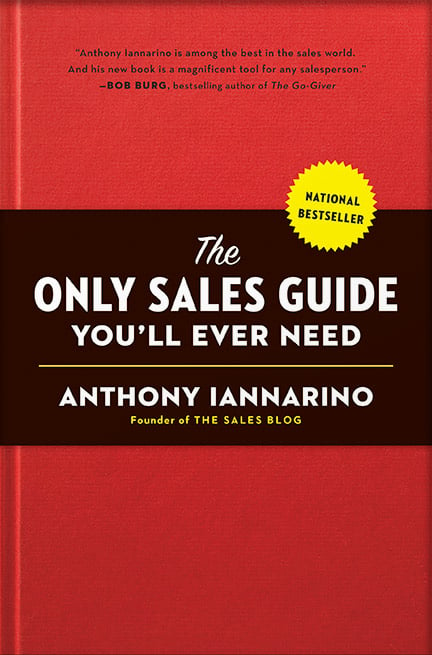My first book, The Only Sales Guide You’ll Ever Need, is really a competency model for success in B2B sales. The book contains two parts, the first part I titled “Mindset,” the second, “Skills.” There are nine individual chapters in the first half of the book and eight in the latter half. Let’s leave the skills for another post and focus instead on “Mindset,” which is a set of character traits.
When you write a book, the publisher gives you a specific number of words. Even though you can write a few more than you they allotted you, it means constraining your writing to what is necessary. The nine chapters include Self-Discipline, Optimism, Caring, Competitiveness, Resourcefulness, Initiative, Persistence, Communication, and Accountability. Were I to expand that section of the book, here is what I would add.Learn Anthony's core strategies & tactics for sales success at any level with The Only Sales Guide You'll Ever Need
Authenticity – Comfortable in Your Skin
These first couple of attributes are going to merge and overlap a bit, but that is the way character traits tend to work. The idea behind the character traits is that possessing them makes it easier for people to buy from you. Possessing them is better than lacking them, and not having them at some reasonable level is likely a liability.
When you are who you are, without a facade, and without putting on an act, you make it easier for people to be themselves. The more comfortable you are in your skin, the easier it is for others to let down their guard. When it is clear you are not hiding something and that you are what you appear to be, you make it easier for people to both like and trust you.
The opposite of this idea is what many people do when they sell. They split themselves into two very different people, the “salesperson” and “the authentic self.” Because they are in a business setting, they pretend to be humorless, buttoned-up, and serious. When you are not who you are, it can make you look like you are hiding something, that you aren’t really who profess to be.
Be who you are.
Confidence – Believing in Yourself
If you had to choose between being overconfident than being under-confident and afraid to act, you are better off being overconfident. Not the overconfidence that would cause you not to be thoughtful or recognize threats, but enough so that you could act.
When you doubt your ability, you can transfer that doubt to your prospective clients. Your concern that you might not be able to generate the results your contacts need becomes their concern, a concern that you will have a difficult time resolving for them.
There are several things you might do to improve your confidence, staring with the idea that, even if things go wrong, you can figure out how to make things work, even if you need help. Spending more time doing something ends to provide greater confidence, especially as your competency tends to grow alongside it. The best way to improve your confidence is to continue to do it until you have the experience to be more confident.
Work on building your competence and your confidence will grow.
Courage – Comfortable with Conflict
Of the dozens of times I have had salespeople ask me if I believe they are in the right role, I always ask the same question: “Are you conflict-averse?” In one hundred percent of the cases, they answer in the affirmative. My recommendation is that they take a martial art if they haven’t taken one, as the physical violence tends to make words a lot less threatening.
The reason selling comes with some amount of conflict is that business comes with a bit of friction. The reason business comes with conflict is because it is the nature of human beings working together. Whether it’s a contact who is offended by being interrupted by a cold call, an aggressive and bullying contact, a difficult negotiation, or an issue that caused you to fail your client, conflict is part of selling.
The more comfortable you are with the conflict that is part of doing business, the better you will be at selling. When you can deescalate the conflict, you will recognize another level of confidence, which brings us to diplomacy.
Diplomacy – Resolving or Preventing Conflict
It turns out that Churchill did not say: “Diplomacy is the art of telling people to go to hell in such a way that they ask for directions,” but I would bet he wished he did. I have previously written about this idea, describing it as being a combative diplomat. Diplomacy requires that you are unshakable, that you use language that deescalates, and possess the ability to keep your head when others are emotional, angry, or under immense stress.
Consultative selling often means telling your dream client their baby is ugly. Now, there are many ways one might say such a thing, and the words I used to convey this idea isn’t a very diplomatic choice. Instead, the diplomat might say, “Would it be okay if I shared with a few ways we have this seen done and how they seem to improve our results? Even though you have no doubt seen some of these things, how we do it might be interesting to you.”
Whether it is a pricing conversation, a failure on yours or your client’s part, you will do better not to avoid the conflict and by using all the tools of diplomacy to deescalate issues.
Sense of Humor – Ability to Engage and Entertain
Some parts of sales can feel a lot like the entertainment business. The ability to engage and entertain people is beneficial. You never have to work on your side hustle as a standup comedian in your client’s board room. But being able to insert some levity in conversations can make working with you less tedious and less of a drag.
The way you increase your contact engagement is to engage them. The sales conversation you are having with your contacts can be smart, interesting, engaging, and fun. Or it can feel like a root canal.
Passion – Giving Yourself Over To Something
One of my favorite interview questions for salespeople is, “What are you passionate about outside of work?” I don’t care what their answer is as much as I care that they are passionate about something. People who are not passionate are generally just marking time. People who have things they care about are more interesting, more engaged, and usually do better than people who are not passionate.
Sure, you are passionate about family and those kinds of things. Maybe you are also excited about your church. What would be better would be that you are the lead tenor in the choir and lead them in competitive showcases. Maybe you breed Siberian Huskies. These things make you attractive, and they prove you have some drive.
The best idea I can give you here is to find something you care enough about to give yourself over to it completely, without withholding any part of you. You’ll be more interesting.
Curiosity – The Desire to Know
The lack of this character trait will harm your results. Serving your clients means being curious, curious about their business, curious about their industry, curious about their role, their challenges, their opportunities, their preferences, and how things work in their world.
You can no longer be a know-nothing in B2B sales. It isn’t enough to know about your company and your products. You also have to understand how things work. You have to be curious enough to read books, watch videos, take courses, and pay attention to what is going in your world.
The best salespeople strive to know and understand.
How can you be a trusted advisor if you know nothing? Curiosity moves you towards subject matter expertise, something that also requires you to understand the context that gives life your recommendation and counsel, which brings us to the next attribute.
Peer – Being One Up
One of the ways salespeople hurt themselves and their results is by not believing they have to right to be consultative, something they would be more confident is they were curious and desired knowledge of their world. Your contacts don’t need someone who believes they are inferior, servile, and people-pleasing. They need someone who knows more than they do, or why else would they require your advice?
You want to be a peer, even if you are sitting across from the CEO of your dream client. You must believe that you belong in the room and that you are going to be able to help your prospective client get better results through your insights and your recommendations. You might think of this idea as being “one up,” knowing more in the area of your expertise. This doesn’t mean your CEO contact doesn’t know as much more on a dozen other topics.
Creating a preference to work with you often comes down to your ability to cover some gaps in your contact’s knowledge and expertise.
Success Orientation – The Hunger
Of all the factors I have explored when it comes to success in any endeavor, including sales, hunger is the very best indicator of success, all other things being equal. You must “want.” Those who don’t desire things they don’t have don’t do well; instead, they settle.
People with written goals, intrinsic motivation, and ambition perform better in sales—and most other endeavors. You can develop a success orientation by doing the work of deciding what you want, pursuing it, and working to be great at what you do.
Working on your character traits and developing your mindset will do as much to improve your sales success as gaining the skills. Working on both is the fastest way to personal and professional development.

Essential Reading!
Get my 3rd book: Eat Their Lunch
"The first ever playbook for B2B salespeople on how to win clients and customers who are already being serviced by your competition."
Buy Now










